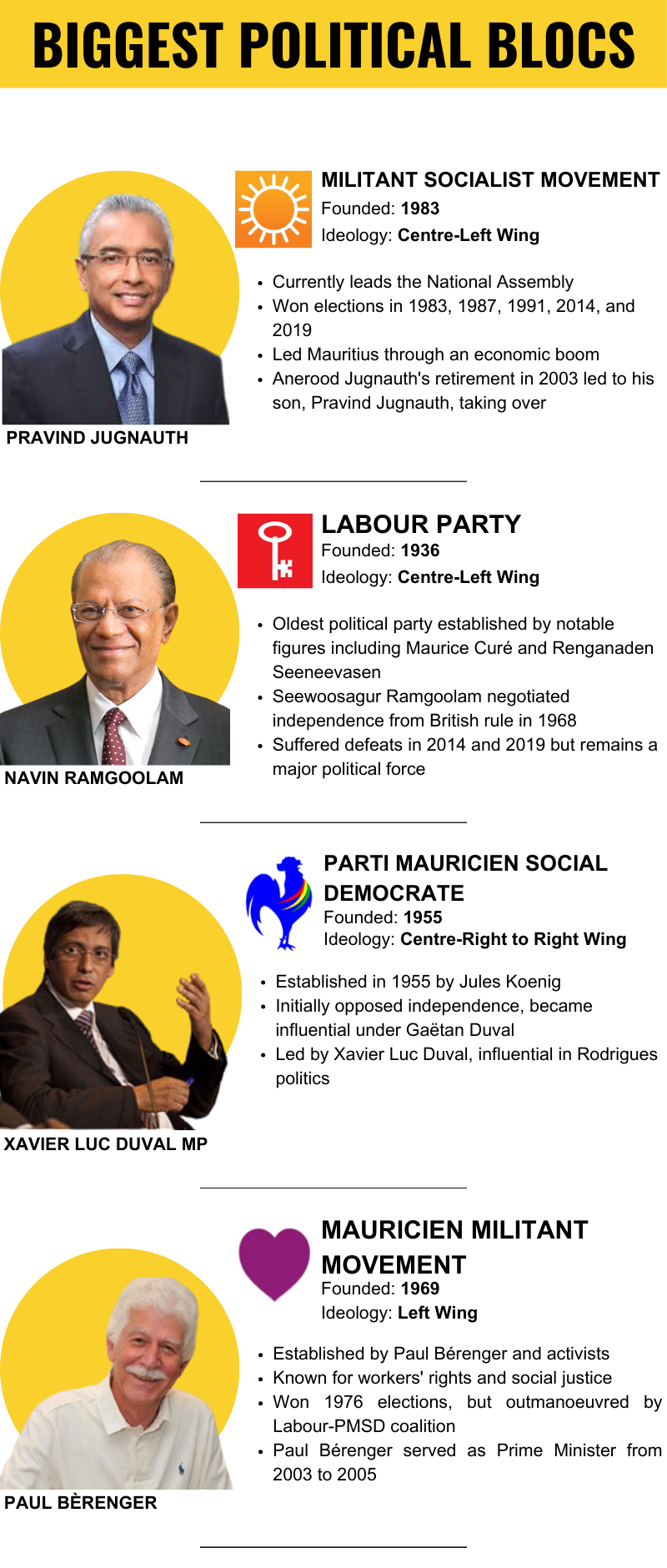Mauritius is set for its presidential elections on November 30, 2024. This event is significant in the country’s democratic process, showcasing its well-established parliamentary system and vibrant political landscape.
Mauritius is the only African country classified as a "full democracy" by the EIU Democracy Index, ranking 21st globally in its 2022 version. This recognition underscores the country's commitment to maintaining a robust and inclusive democratic framework.
Mauritius follows a parliamentary democracy, with elections held every five years. The president, largely a ceremonial figure, is elected by the National Assembly, which comprises 70 members. The real executive power resides with the Prime Minister.
The electoral process in Mauritius is designed to be inclusive and representative. The National Assembly consists of 70 members, with 62 directly elected from constituencies. The country is divided into 21 constituencies, with 20 on the main island and one covering Rodrigues Island. Each constituency elects three members, except Rodrigues, which elects two.
Voters in Mauritius can vote for up to three (or two) candidates in their district using a plurality block voting system. This system allows voters to select multiple candidates, enhancing representative inclusivity. However, there is malapportionment as the number of voters per district varies widely.
Mauritius employs a multi-party system, encouraging a diverse political landscape. Multiple parties contest elections, forming coalitions and blocs to maximize their electoral strength. The "best loser" system ensures broader representation by allocating additional seats to the highest-polling losing candidates, based on ethnic and religious considerations. This system helps maintain a balanced representation of the various communities within the National Assembly.
A distinctive feature of the Mauritian electoral system is the Best Loser System. This mechanism ensures that the representation of different ethnic groups in the National Assembly is balanced, promoting social harmony and inclusiveness.
The system is unique to the country though there are countries within Under this system, an additional eight members are appointed from among the best-performing losing candidates, ensuring that the final composition of the Assembly reflects the country's diverse population.
The ethnic representation in Mauritius is shown below.
The system can be best summarized in the following way:
The chart below shows the composition of Best Losers over the previous elections.
The trend suggests that:
Mauritius has been a vibrant democracy since its independence in 1968. Parties and leaders from the freedom movement went on to hold significant positions in the country's political landscape.
Over the span of twelve national elections, political power in Mauritius has primarily been a tug-of-war among three major parties. The MSM has claimed victory in six of these contests (1983, 1987, 1991, 2000, 2014, and 2019), while the Labour Party has emerged triumphant in four (1967, 1995, 2005, and 2010). The MMM, though less frequently victorious, made significant marks with wins in 1976 and 1982. Dominating the political landscape, the premiership has largely oscillated between the Ramgoolam and Jugnauth dynasties, with a brief interlude from 2003 to 2005 when Paul Berenger ascended to prime minister through an alliance with the Jugnauths.

The 2024 elections are crucial as they will determine the composition of the National Assembly and the leadership for the next term. The ruling Militant Socialist Movement (MSM) seeks to retain its majority under Prime Minister Pravind Jugnauth.
We analysed the 2024 BTI Country Report for Mauritius. The following issues are likely to play a significant role in the coming elections:
The 2024 presidential elections in Mauritius represent a pivotal moment in the country's democratic journey, reaffirming its commitment to a robust and inclusive political framework. With its unique electoral systems, such as the Best Loser System, and a vibrant multi-party landscape, Mauritius continues to be a beacon of democracy in Africa. As the nation prepares for the elections, key issues ranging from governance and economic management to social and environmental challenges will shape the political discourse. The outcome of these elections will not only influence the immediate political landscape but also set the course for Mauritius's future, ensuring that it remains a strong and democratic nation committed to the principles of inclusivity and representation.
We will be uploading more content on Mauritius as the elections draw closer, providing in-depth analysis and updates on this significant event.

Dhruv Research owned by DHRUVA RESEARCH
Copyright © 2021
DHRUVA RESEARCH.
All rights reserved.